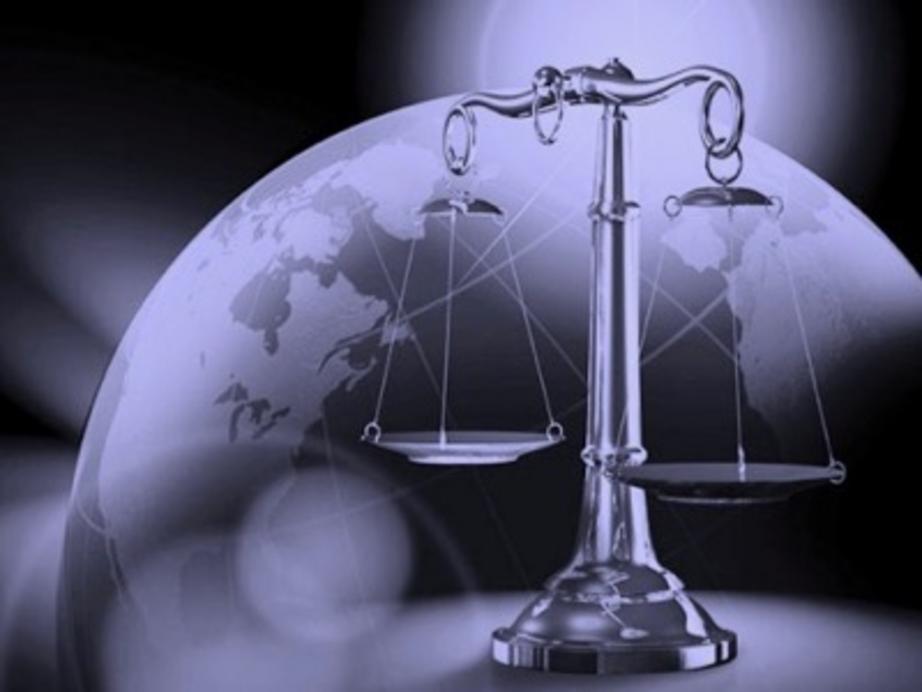The end of international law?
The war against the Greater Middle East should end with the withdrawal of US troops within the next six months. And yet nothing proves that peace will settle in each of the countries that were invaded. Today we are witnessing what seems to be a tentative to get rid of international law. Will this consolidate a division of the world into two parts, or will it open to a generalised conflict?
Do the Western powers hope to put an end to the constraints of International Law? That is the question asked by the Russian Minister for Foreign Affairs, Sergueï Lavrov, at the Moscow conference on International Security [1].
Over the last few years, Washington has been promoting the concept of « unilateralism ». International Law and the United Nations are supposed to bow to the power of the United States.
This concept of political life is born of the History of the United States - the colonists who came to the Americas intended to live as they chose and make a fortune there. Each community developed its own laws and refused the intervention of a central government in local affairs. The President and the Federal Congress are charged with Defense and Foreign Affairs, but like the citizens themselves, they refused to accept an authority above their own.
Bill Clinton attacked Yugoslavia, blithely violating Internal Law. George Bush Jr. did the same by attacking Iraq, and Barack Obama by attacking Libya and Syria. As for Donald Trump, he has never hidden his distrust of supra-national rules.
Making an allusion to the Cebrowski-Barnett doctrine [2], Sergueï Lavrov declared: « We have the clear impression that the United States seek to maintain a state of controlled chaos in this immense geopolitical area [the Near East], hoping to use it to justify the military presence of the USA in the region, without any time limit, in order to promote their own agenda ».
The United Kingdom also seem to feel quite comfortable with breaking the Law. Last month, it accused Moscow in the « Skripal affair », without the slightest proof, and attempted to unite a majority of the General Assembly of the UN to exclude Russia from the Security Council. It would of course be easier for the Anglo-Saxons to unilaterally rewrite the Law without having to take notice of the opinions of their opponents.
Moscow does not believe that London took this initiative. It considers that Washington is calling the shots.
« Globalisation », in other words the « globalisation of Anglo-Saxon values », has created a class society between states. But we should not confuse this new problem with the existence of the right to a veto. Of course, the UNO, while it declares equality between states whatever their size, distinguishes, within the Security Council, five permanent members who have a veto. This Directorate, composed of the main victors of the Second World War, is a necessity for them to accept the principle of supra-national Law. However, when this Directorate fails to embody the Law, the General Assembly may take its place. At least in theory, because the smaller states which vote against a greater state are obliged to suffer retaliatory measures.
La « globalisation of Anglo-Saxon values » ignores honour and highlights profit, so that the weight of the propositions by any state will be measured only by the economic development of its country. However, over the years, three states have managed to gain an audience to the foundations of their propositions, and not in function of their economy – they are the Iran of Mahmoud Ahmadinejad (today under house arrest in his own country), the Venezuela of Hugo Chávez, and the Holy See.
The confusion engendered by Anglo-Saxon values has led to the financing of intergovernmental organisations with private money. As one thing leads to another, the member states of the International Telecommunication Union (ITU), for example, have progressively abandoned their propositional power to the profit of private telecom operators, who are united in a « consultative committee ».
« Communication », a new name for « propaganda », has become the imperative in international relations. From the US Secretary of State brandishing a phial of pseudo-anthrax to the British Minister for Foreign Affairs lying about the origin of Novitchok in the Salisbury affair, lies have become the substitute for respect, and cause general mistrust.
During the first years of its creation, the UNO attempted to forbid « war propaganda », but today, it is the permanent members of the Security Council who indulge in it.
The worst occurred in 2012, when Washington managed to obtain the nomination of one of its worst war-hawks, Jeffrey Feltman, as the number 2 of the UNO [3]. From that date onward, wars have been orchestrated in New York by the very institution that is supposed to prevent them.
Russia is wondering today about the possible desire of the Western powers to to block the United Nations. If this is so, it would create an alternative institution, but there would no longer be a forum which would enable the two blocks to discuss matters.
Just as a society which falls into chaos, where men are wolves for men when deprived of the Law, so the world will become a battle-field if it abandons International Law.
Translation
Pete Kimberley
[1] “Sergey Lavrov’s remarks at the 7th Moscow Conference on International Security”, by Sergey Lavrov, Voltaire Network, 5 April 2018.
[2] “The US military project for the world”, by Thierry Meyssan, Translation Pete Kimberley, Voltaire Network, 22 August 2017.
[3] “Germany and the UNO against Syria”, by Thierry Meyssan, Translation Pete Kimberley, Al-Watan (Syria) , Voltaire Network, 28 January 2016. “Feltman confirmed at the UN”, Translation Anoosha Boralessa, Voltaire Network, 16 February 2017.

